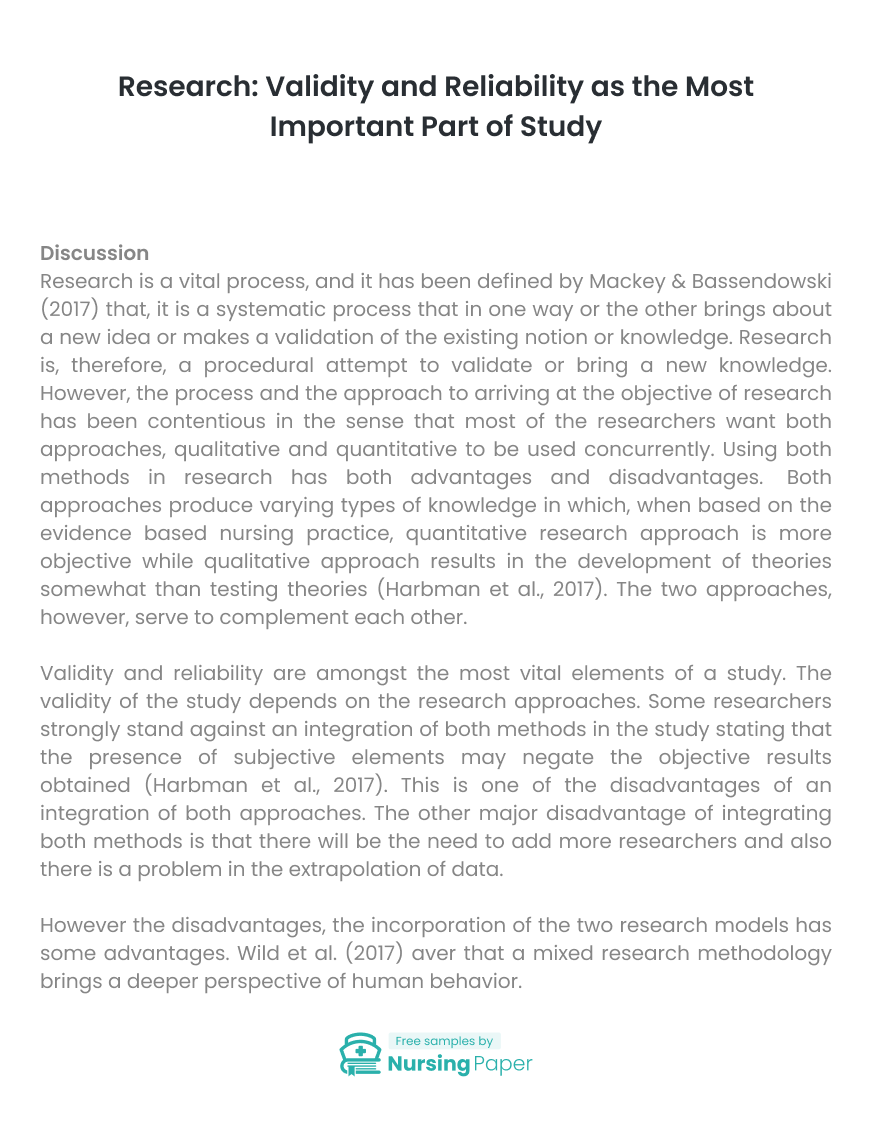
Research: Validity and Reliability as the Most Important Part of Study
Discussion
Research is a vital process, and it has been defined by Mackey & Bassendowski (2017) that, it is a systematic process that in one way or the other brings about a new idea or makes a validation of the existing notion or knowledge. Research is, therefore, a procedural attempt to validate or bring a new knowledge. However, the process and the approach to arriving at the objective of research has been contentious in the sense that most of the researchers want both approaches, qualitative and quantitative to be used concurrently. Using both methods in research has both advantages and disadvantages. Both approaches produce varying types of knowledge in which, when based on the evidence based nursing practice, quantitative research approach is more objective while qualitative approach results in the development of theories somewhat than testing theories (Harbman et al., 2017). The two approaches, however, serve to complement each other.
Validity and reliability are amongst the most vital elements of a study. The validity of the study depends on the research approaches. Some researchers strongly stand against an integration of both methods in the study stating that the presence of subjective elements may negate the objective results obtained (Harbman et al., 2017). This is one of the disadvantages of an integration of both approaches. The other major disadvantage of integrating both methods is that there will be the need to add more researchers and also there is a problem in the extrapolation of data.


However the disadvantages, the incorporation of the two research models has some advantages. Wild et al. (2017) aver that a mixed research methodology brings a deeper perspective of human behavior. From this point, it can, therefore, be claimed that the mixed research approaches improve the validity and the reliability of the research.
1. Harbman, P., Bryant‐Lukosius, D., Martin‐Misener, R., Carter, N., Covell, C. L., Donald, F., … & Sherifali, D. (2017). Partners in research: building academic‐practice partnerships to educate and mentor advanced practice nurses. Journal of evaluation in clinical practice, 23(2), 382-390.
2. Mackey, A., & Bassendowski, S. (2017). The History of Evidence-Based Practice in Nursing Education and Practice. Journal of Professional Nursing, 33(1), 51-55.
3. Wild, D., Wild, D., Whiteman, B., Whiteman, B., Biggerstaff, D., Biggerstaff, D., … & Szczepura, A. (2017). Qualitative research approaches used in UK nursing studies: An overview with examples. 看護研究, 50(3), 254-262.



The download will start shortly.

The download will start shortly.
 Subject:
Nursing
Subject:
Nursing  Number of pages: 5
Number of pages: 5  Subject:
Nursing
Subject:
Nursing  Number of pages: 5
Number of pages: 5  Subject:
Nursing
Subject:
Nursing  Number of pages: 13
Number of pages: 13  Subject:
Health and Social Care
Subject:
Health and Social Care  Number of pages: 10
Number of pages: 10  Subject:
Nursing
Subject:
Nursing  Number of pages: 3
Number of pages: 3  Subject:
Health and Social Care
Subject:
Health and Social Care  Number of pages: 6
Number of pages: 6  Subject:
Nursing
Subject:
Nursing  Number of pages: 4
Number of pages: 4  Subject:
Health and Social Care
Subject:
Health and Social Care  Number of pages: 3
Number of pages: 3  Subject:
Health and Social Care
Subject:
Health and Social Care  Number of pages: 3
Number of pages: 3  Subject:
Medicine
Subject:
Medicine  Number of pages: 3
Number of pages: 3  Subject:
Medicine
Subject:
Medicine  Number of pages: 4
Number of pages: 4  Subject:
Health and Social Care
Subject:
Health and Social Care  Number of pages: 4
Number of pages: 4  Subject:
Health and Social Care
Subject:
Health and Social Care  Number of pages: 4
Number of pages: 4  Subject:
Medicine
Subject:
Medicine  Number of pages: 10
Number of pages: 10  Subject:
Health and Social Care
Subject:
Health and Social Care  Number of pages: 1
Number of pages: 1 
